Whenever you get a new tattoo, the after care is very important, to ensure the tattoo heals as well as possible, without any blurred edges or fading.
Your tattoo artist will always give you some aftercare guidelines, and Aquaphor Healing Ointment is a popular post-tattoo treatment, but what happens if you apply too much Aquaphor on tattoo? What happens? Keep on reading to find out…
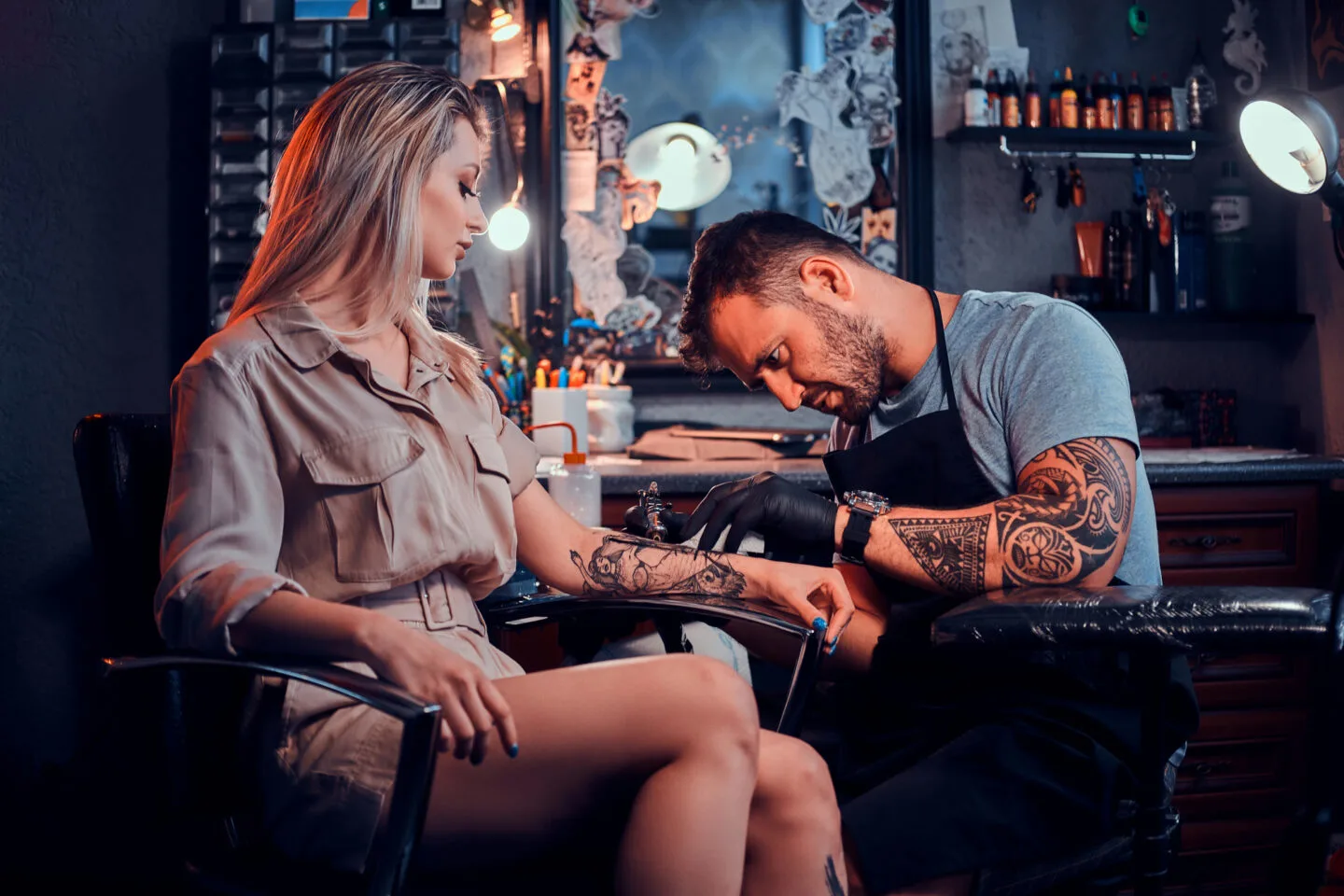
What Is Aquaphor?
Aquaphor is one of the top selling skin care products in the US, and it claims to be an advanced healing ointment, providing deep moisture and helping to heal all types of dry skin problems.
It uses natural ingredients like petrolatum and glycerin to protect the skin from irritants and reduce itchiness.
As well as being used for dry skin and other conditions, Aquaphor is also recommended by dermatologists for treating scars, abrasions, eczema, psoriasis, chapped lips and minor cuts or burns.
Interestingly, products like Aquaphor are often used routinely by cosmetic surgeons on their patients following operations, as it provides protection against infection while effectively moisturizing the surrounding area during healing.
Aquaphor Ingredients List
Petrolatum (41%) – Skin Protectant (Ointment). Inactive Ingredients Mineral Oil, Ceresin, Lanolin Alcohol, Panthenol, Glycerin, Bisabolol.
What Are The Benefits Of Using Aquaphor?
Aquaphor is a skincare product made by Eucerin that is known for its healing and moisturizing properties.
Aquaphor is a versatile product that can be used for many different purposes, including moisturizing dry skin and helping soothe chapped lips, cuts, scrapes and bruises.
Aquaphor contains natural ingredients such as Vitamin E, which helps to heal dry skin and protect it from environmental damage.
Aquaphor also contains dimethicone, which creates a barrier on the skin that prevents moisture loss and helps to maintain healthy skin.
By using Aquaphor regularly, people can experience many benefits, such as softer and smoother skin, improved hydration, reduced dryness and irritation, and a more youthful complexion.
As well as having moisturizing properties, Aquaphor is also great for soothing the symptoms of minor skin irritations, such as eczema, psoriasis, and sunburns.
Furthermore, Aquaphor can provide a layer of protection from the harmful effects of the sun’s UV rays.
What Are The Best Tattoo Aftercare Tips?
Getting a tattoo is a great way to express yourself, but it also requires that you take proper care of it afterwards.
To make sure your tattoo ink stays looking its best, it’s important to follow the aftercare instructions given to you by your tattoo artists. Here are some of the best tattoo aftercare tips to keep in mind:
First and foremost, leave the bandage on for at least a few hours after getting your tattoo.
Afterwards, gently remove the bandage and wash your tattoo with lukewarm water and an unscented, mild soap.
Pat the area dry with a clean, fresh piece of cloth or gauze, and apply a thin layer of a fragrance-free lotion or ointment.
It’s also recommended that you avoid soaking your tattoo in water for at least a couple of weeks, as this can cause infection.
That includes showers, swimming pools, hot tubes and baths. Furthermore, it’s important to keep the area clean using a mild soap and water, but avoid scrubbing it too hard.
Make sure to wear sunblock over your tattoo if you plan on spending time outdoors.
Sunlight can cause your tattoo to fade, so use an SPF 30 or higher sunblock that isn’t too greasy or scented.
Or avoid sun exposure entirely, to protect the area, or at least for prolonged periods of sun exposure.
Never use tanning beds either, as they’re very damaging for new tattoos.
Be sure to keep the area moisturized with a fragrance-free unscented lotion or ointment throughout the healing process, by applying the lotion in a circular motion.
As it helps keep your skin soft and prevents scabbing. It’s essential you keep the skin hydrated with a skin protectant ointment, in order to encourage healthy healing, in your tattoo care routine.
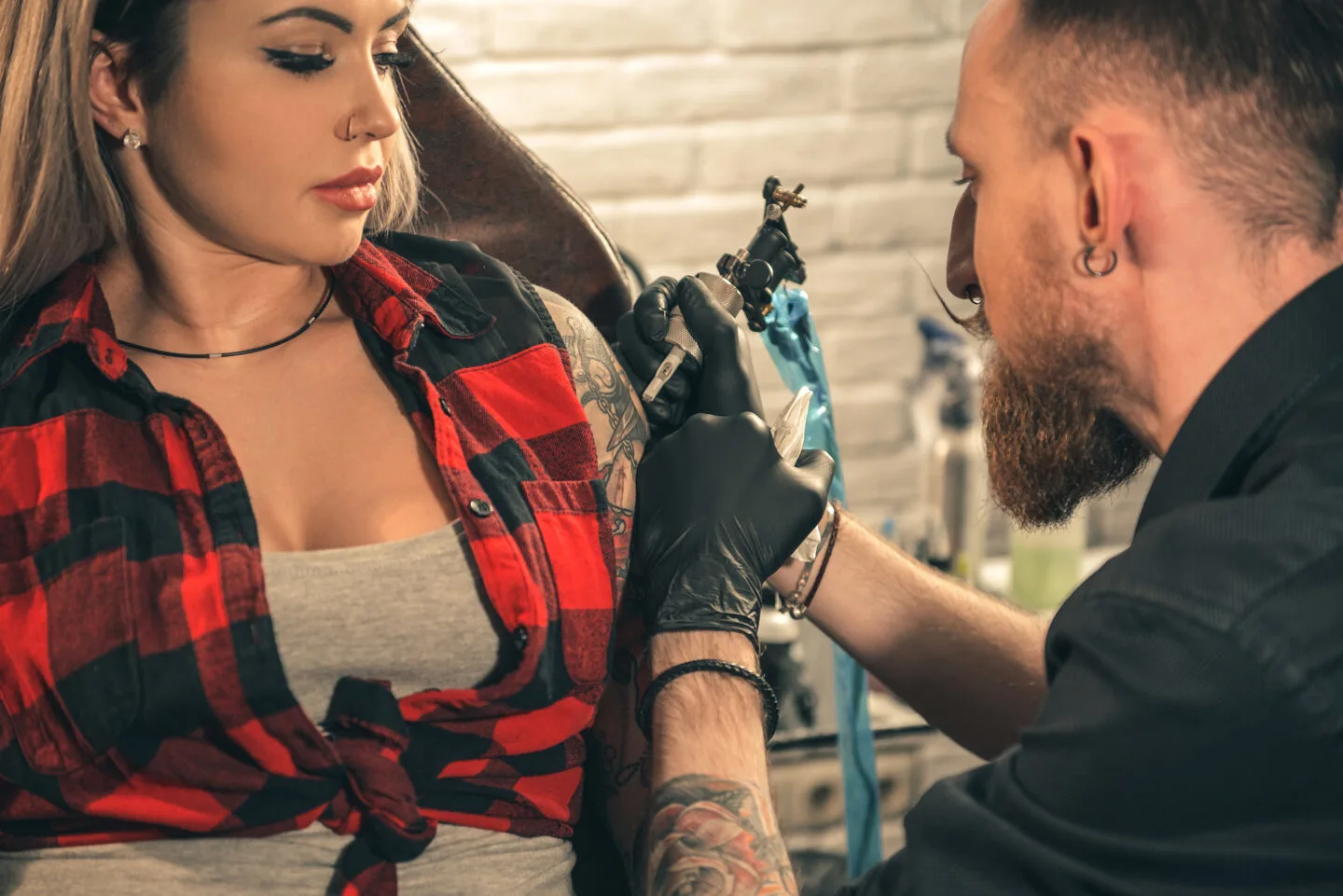
How Many Days Does It Take For Your Tattoo To Heal?
While the physical process of receiving a tattoo may only take a few hours, the period it takes for your tattoo to heal properly can easily last several weeks.
After the session is complete, you should expect to have redness and slight bleeding in the affected area. You’ll also notice flaking, peeling and swelling as part of the healing process.
The appropriate aftercare steps should be taken to reduce any risks for infections and speed up the healing process.
Caring for your healing tattoo correctly will also help avoid flakiness and uneven pigment in your finished design.
With good hygiene practices and patience, you can expect your new tattoo to fully heal within 2-3 weeks. Although the early days of tattoo healing are the most important.
Can I Use Aquaphor on My Tattoo?
You might be wondering if it’s safe to use Aquaphor on your newly inked tattoo, as your chosen tattoo aftercare product of choice.
Aquaphor is a popular ointment that is often used to treat dry, cracked skin and protect against infection.
While it is generally safe to use Aquaphor on a new tattoo, it is best to speak to a professional tattoo artist before doing so, to check it’s suitable for the tattoo aftercare steps.
Aquaphor for tattoos, contains petroleum jelly and humectants, which help to make the skin soft and supple.
While this can be great for healing and protecting your new tattoo, it can also create a barrier that prevents the skin from breathing properly.
This can make your tattoo healing process longer and more painful.
Although certain ingredients in Aquaphor ointment can be irritating to the skin and trigger an allergic reaction, especially if you already have sensitive skin.
So, ensure you do a patch test on a non-tattooed part of your skin, just to test and see how the ingredients react with your skin, if you’re yet to try Aquaphor.
How Much Aquaphor to Put on Tattoo?
If you have recently gotten a tattoo, it is important that you know how much Aquaphor to put on it.
Aquaphor is a great way to keep your brand-new tattoo looking fresh and vibrant for as long as possible.
To get the most out of your Aquaphor, it is important that you follow the instructions from your tattoo artist and use the correct amount.
Generally, you should apply a thin layer of Aquaphor twice daily, once in the morning and once at night.
When applying Aquaphor, try to use only a small amount and be sure to rub it gently into the skin.
Do not use too much as this can lead to skin irritation, due to irritating ingredients.
Plus, if you are showering, it is best to wait at least two hours after applying before getting into the water.
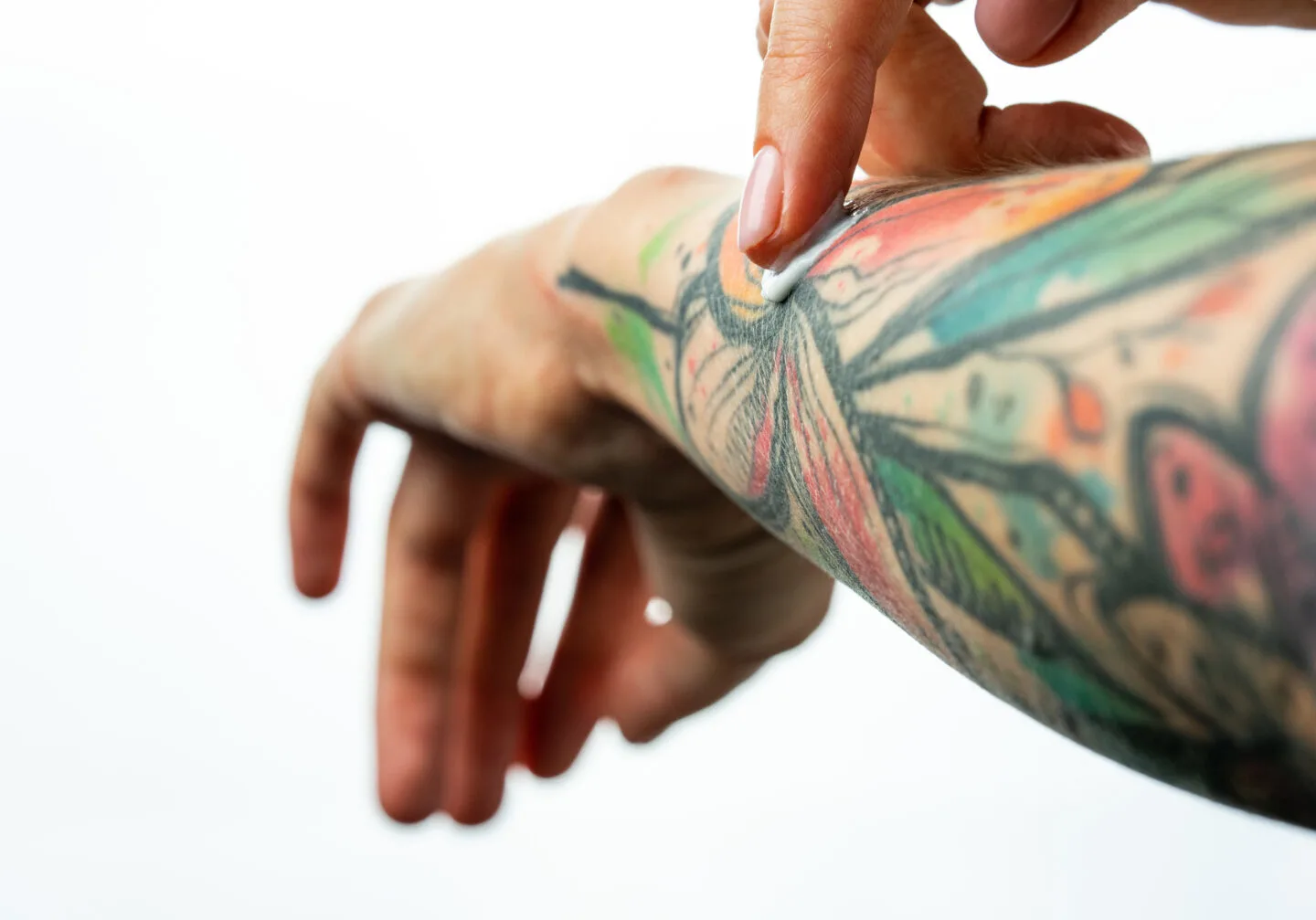
How To Apply Aquaphor To Fresh Tattoos
Taking proper care of a new tattoo is absolutely essential. Applying Aquaphor to fresh tattoos is an important part of their healing process.
To begin, wash your hands thoroughly before touching the tattoo area, and ensure you’ve kept your tattoo dry.
Then, take enough Aquaphor onto clean fingers and gently massage the ointment into the area with a thin layer.
After each application, be sure to properly dispose of any used tissues and wash your hands with antibacterial soap and warm water again.
For best results, apply Aquaphor multiple times throughout the day for about 2-4 weeks, or until the area is fully healed.
This will help ensure that your tattoo heals as fast and comfortably as possible.
How Often Should I Apply Aquaphor To Fresh Tattoos?
When it comes to the frequency of application, the best rule of thumb is to follow your artist’s advice.
Different tattooists may have different recommendations, but generally, they suggest applying a thin layer of Aquaphor two or three times a day.
The goal is to keep the skin supple and well-moisturized to reduce the risk of infection and improve the healing process.
It’s important to note that less is more when it comes to applying Aquaphor.
Too much can cause an accumulation of product and lead to adverse effects.
If this happens, please keep in mind that it can be uncomfortable, so it’s best to use only a thin layer of Aquaphor with each application.
So, be sure to cleanse the area lightly and thoroughly before reapplying for best results.
How Long Should You Apply Aquaphor To Your New Tattoo For?
Aquaphor healing ointment should be applied for up to two weeks following your new ink, or until the tattoo completely heals.
To apply the healing balm, you should clean the area with care, preferably using an unscented and non-abrasive cleanser with warm water.
Once the tattooed area is thoroughly clean, you should then apply a thin layer of Aquaphor to soothe and protect the tattoo, taking care not to rub it into the skin too hard.
As your tattoo heals, you can reduce how often you apply Aquaphor while keeping an eye on any signs of irritation such as redness or flaky skin.
Does Aquaphor Affect Ink Retention When Applied To New Tattoos?
The answer is that it does not necessarily cause the ink to fade faster, but it does need to be managed properly in order for the entire color and design of your tattoo to remain vibrant.
Aquaphor should only be applied after the surface of the skin has healed from the initial tattooing process, and should never replace healing balms or aftercare products such as A&D Ointment that are specifically designed for tattoos.
Applying Aquaphor too soon can slow down the process of allowing oxygen into the wound site, which can prevent proper healing and limit your body’s ability to accept any pigment placed during your tattoo session. This could lead to fading later on due to inadequate ink absorption.
If you do choose to use Aquaphor on your fresh tattoo, make sure you do not apply too much product at once.
Or, leave it on overnight as this could trap moisture underneath and create an environment ripe for bacteria growth which can eventually lead to infection or further discoloration of your tattooed area.
While Aquaphor may temporarily soothe newly inked skin, it should always be used in moderation and with caution to preserve both its appearance and longevity over time.
Does Aquaphor Cause Pimples For New Tattoos?
While experts agree that proper aftercare is necessary to ensure that the tattoo heals without any infection, many disagree on whether Aquaphor should be part of the process, and if they cause tattoo pimples.
Some argue that using this ointment leads to pore clogging, which in turn can cause pimples around the tattoo area.
On the other hand, others tout its hydrating properties as beneficial for a freshly done tattoo and claim that it does not increase the risk for pimples.
Which Lotions And Ointments Are Not Tattoo Safe?
Many people are tempted to reach for common lotions, ointments and creams during the healing process of a tattoo.
However, there are certain products that can cause complications such as excessive scabbing or make the colors in your tattoo fade faster than they should.
It is best to avoid any kind of oil-based or greasy products, as these will interrupt the natural healing process.
Sunscreen is another one to avoid; it should not be applied directly over a new tattoo, since it typically contains chemical ingredients and oils that can damage the new artwork.
Products that contain alcohol, mineral oil, lanolin, and fragrances are less than ideal to use on tattoos because they also impede with proper healing and can cause skin irritation.
When to Switch from Aquaphor to Lotion Tattoo
When it comes to the healing process of a tattoo, it is important to research and understand what products to use at each stage in the healing process.
Aquaphor is a very common and popular ointment used to treat tattoos during the first stage of healing, and when the tattoo is still in the scabbing process.
Once this phase has passed, usually after 2-3 weeks, it is time to switch from Aquaphor to a lighter moisturizer.
Using lotion on your tattoo will help keep it soft and looking good without irritating the still healing skin.
It’s important to use a lotion specifically designed for tattoos, as it can help maintain the vibrancy of colors over time.
If using a lotion with chemicals, make sure to do a patch test on a small area of the tattoo first to ensure that it won’t cause any irritation.
Also, try to avoid lotions with fragrance or essential oils, as these can irritate the skin and cause problems.
Keeping a tattoo moisturized is essential, so make sure to keep up with it even after the healing process is over.
This means continuing to use a good quality tattoo lotion on a daily basis to maintain its color and avoid drying and cracking.
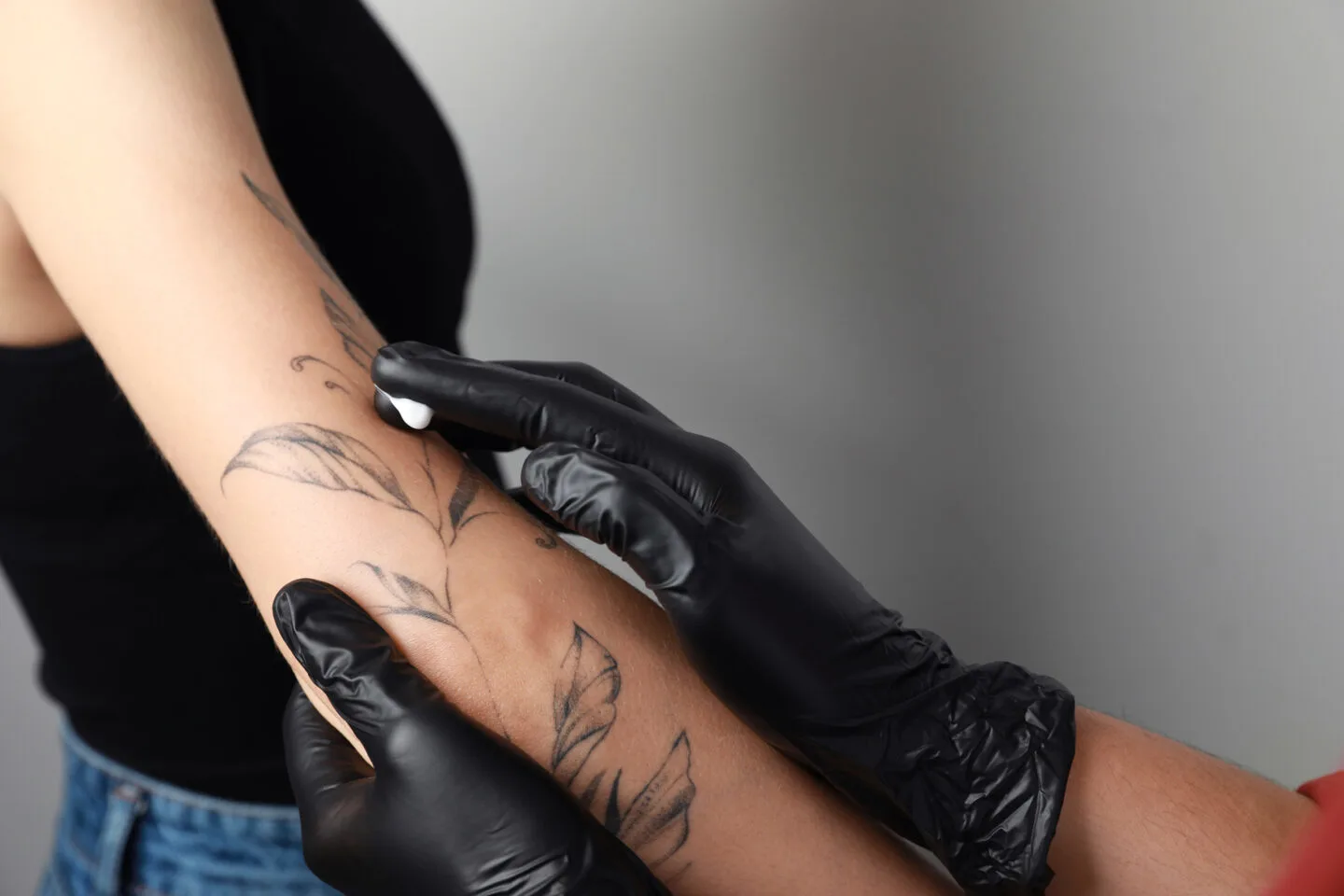
What Is Better For New Tattoos: Aquaphor Vs Lotion?
When it comes to choosing the best product for a new tattoo, Aquaphor and lotion are both popular options.
While lotions can be great for keeping skin moisturized, too much moisture can be detrimental to a newly inked tattoo.
On the other hand, Aquaphor is less likely to irritate than a lotion because it is more closely associated with cleanliness due to its medical background.
As with any type of aftercare, the cleanest option is always best; so when using either of these products, remember to apply them using clean hands or clean paper towels to ensure that your healing tattoo process goes smoothly, and your tattooed skin looks its best.
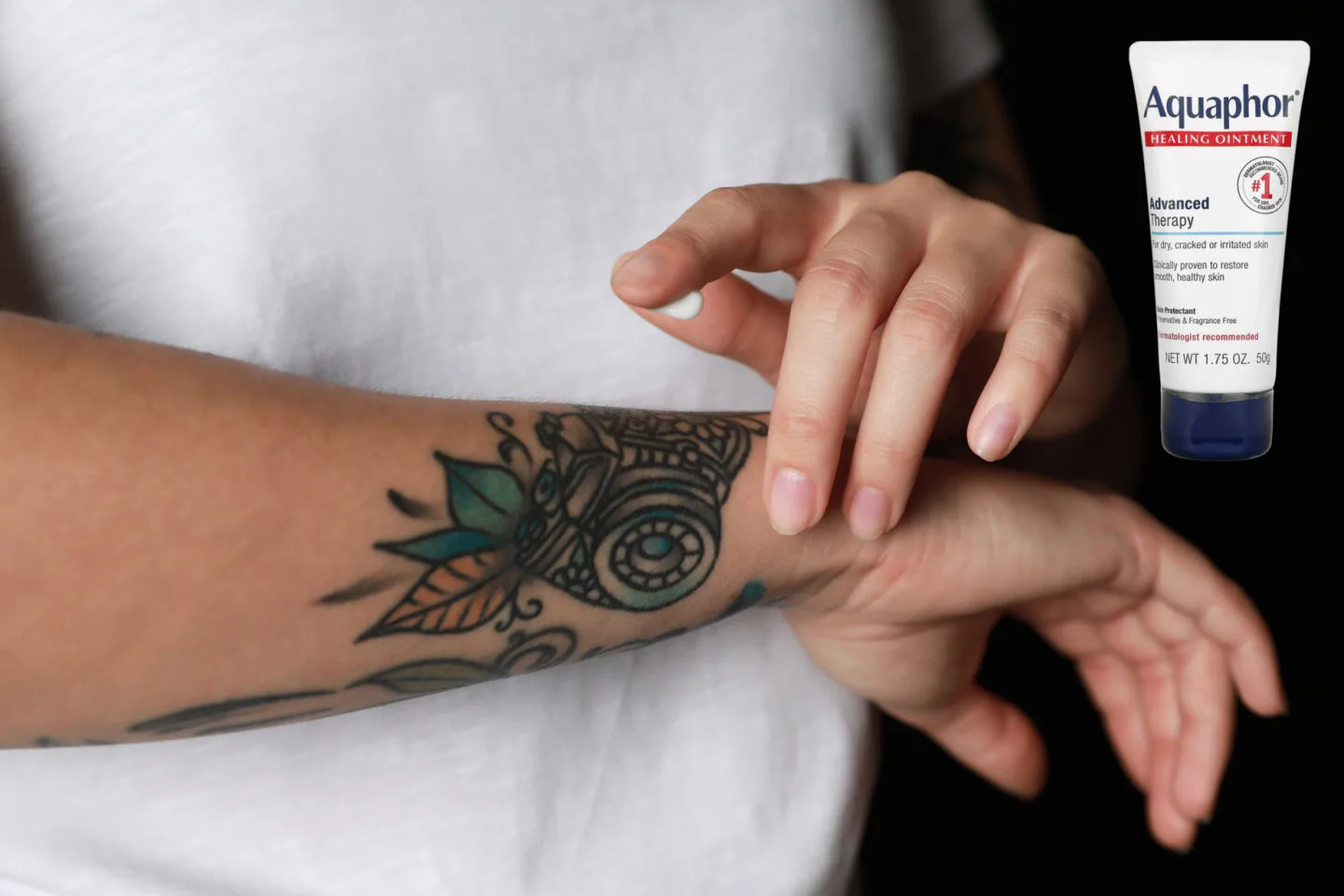
Summary
Aquaphor is a popular product used on new tattoos to help them heal and remain soft.
However, it is important not to apply too much as this can lead to skin irritation, fading of the tattoo ink, and an increased risk of infection.
To avoid these complications, make sure you only use a thin layer and cover the area with breathable fabric to protect it overnight.
Following these guidelines and listening to your tattoo artist’s advice will help ensure a healthy, vibrant healed tattoo.

Hi, my name is Gemma, and I’m the owner of MakeupMuddle.com. I’m a true beauty obsessive, and love writing about anything to do with beauty – I have been a beauty writer since 2012.
